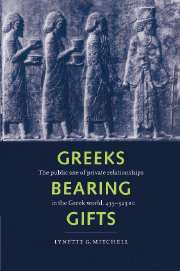Book contents
- Frontmatter
- Contents
- Preface
- Abbreviations
- 1 Philia
- 2 Philia and the polis
- 3 Philia and political activity
- 4 Magisterial appointments: Sparta
- 5 Magisterial appointments: Athens
- 6 Persia and the Greeks
- 7 Athenians and Thracians
- 8 Philip and the Greeks
- 9 Alexander
- 10 Friendship and ideology
- Appendix I Magistrates with connections
- Appendix II Notes on magistrates for the years 435–323 BC
- Bibliography
- Indexes
5 - Magisterial appointments: Athens
Published online by Cambridge University Press: 06 July 2010
- Frontmatter
- Contents
- Preface
- Abbreviations
- 1 Philia
- 2 Philia and the polis
- 3 Philia and political activity
- 4 Magisterial appointments: Sparta
- 5 Magisterial appointments: Athens
- 6 Persia and the Greeks
- 7 Athenians and Thracians
- 8 Philip and the Greeks
- 9 Alexander
- 10 Friendship and ideology
- Appendix I Magistrates with connections
- Appendix II Notes on magistrates for the years 435–323 BC
- Bibliography
- Indexes
Summary
Friendship is a disinterested commerce between equals; love, an object intercourse between tyrants and slaves.
O. Goldsmith, The Good Natured ManAmbassadorial appointments
At Sparta, as we have just seen, personal connections were one of the factors which could influence magisterial appointments. If we turn now to Athens, we can also see that there were clearly instances (although by no means all) where selection seems to have been influenced by an individual's connections, and I have set out below some of the best examples.
Nicias son of Niceratus
Nicias was one of the three generals who swore to the armistice with Sparta in 423. The Spartans also conducted their negotiations for peace in 421 through Nicias and Laches, to the disgust of Alcibiades, and Nicias is known to have had a xenia with the family of the Spartan king Pausanias son of Pleistoanax. In addition, when the Spartan envoys tried to prevent the Argive–Athenian alliance supported by Alcibiades in 420, Thucydides' narrative makes it clear that the Spartans again were working primarily through Nicias. What is more, after the earthquake prevented the Athenians making the alliance with the Argives, Nicias persuaded the Athenians to send ambassadors to Sparta with Nicias himself as one of them. Given his recent relations with Sparta, it was a suitable choice.
Aristophanes son of Nicophemus
Aristophanes had connections with Cyprus through his father Nicophemus (who lived there with his Cypriot wife and their children), and eagerly supported the interests of Cyprus and Euagoras king of Salamis in Athens.
- Type
- Chapter
- Information
- Greeks Bearing GiftsThe Public Use of Private Relationships in the Greek World, 435–323 BC, pp. 90 - 110Publisher: Cambridge University PressPrint publication year: 1998



